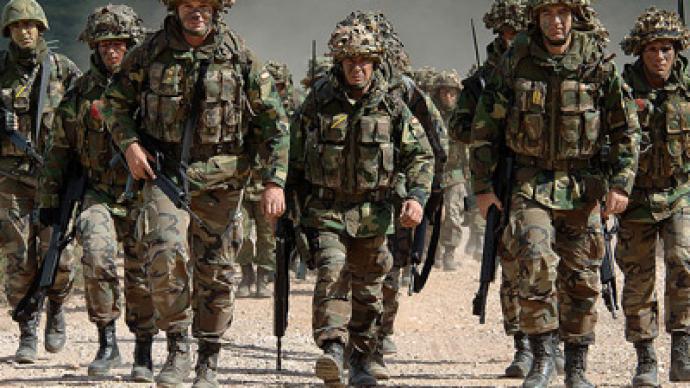Who can afford to fight America's wars?

As the NATO summit gets underway in Lisbon amidst economic austerity and a seemingly endless war in Afghanistan, people are questioning if members can afford to promise to defend each other anymore, or if they should even try.
NATO was an alliance born of fear, fear of the Red Army, fear of Communism's spread westward. "It was originally supposed to defend Western Europe from the Soviet Union," said Ivan Eland, the director of the Center on Peace & Liberty at The Independent Institute. Those threats, whether real or perceived, were enough to help America gather its European allies to form a new military block, the North Atlantic Treaty organization, in 1949.America marketed NATO as the world's hope or a better future. "The US, keenly aware of its strategic role as leader of the free world has allied itself with other nations dedicated to preservation of peace," said a US Defense Department propaganda video from the time.Under NATO, this so-called "preservation of peace" legitimized the presence of US troops and military bases from Norway to Turkey, massive military budgets, and the position of the US as the leader of the Western world.But the fall of the Berlin Wall changed all of that, bringing with it the rise of this Rhetoric."It's a message of peace and goodwill and hope for a growing friendship and closeness between our two peoples," then-US President Ronald Reagan told a crowd at Moscow State University in 1988.The military alliance forged against the Soviet threat, was now deprived of its enemy. Many expected NATO to be dissolved. And Gorbachev thought he had a promise that NATO would be kept at bay."There was an understanding there would be no expansion of NATO, that there would be a common European structure of cooperation and security," said former Soviet Union President Mikhail Gorbachev in a 1996 television interview with Charlie Rose.It was a promise that NATO broke over and over again in the post-Cold War years."It was expanding in both mission and territory and the phrase of the day was ‘expand or die’," Eland said of NATO at the time.And as it expanded to include Baltic States and Eastern European countries, so did distrust and tensions."A powerful military block appearing near our borders will be perceived in Russia as a direct threat to the security of our country," Russian Prime Minster Vladimir Putin, then President, said at a press conference in 2008 after talks with NATO had broken down.What is this 20th century alliance doing in the 21st century world?"NATO's been in an identity crises for awhile," remarked Patrica DeGennaro, adjunct professor in the department of politics at New York University.Weakened severely by the seemingly endless Afghan war, the power of the block is in question, along with the purpose of the combat mission."Most European countries know what it means to be in the middle of a war so they are asking some hard questions," said DeGennaro. "Who are we going to send and how many people are we willing to give up in a situation where we're really not sure what the context of the intervention is."And there's the question of if, in the context of NATO, it's the United States whose goals are being served."It enables the US to do two things," Lawrence Korb, senior fellow at Center for American Progress, said of NATO. "One, to assure American people that threats they’re dealing with for example in Afghanistan, are not just against the US. And that the US while it's still world’s greatest power is no longer a power that can do everything by itself."And amidst economic crises and turmoil, it's unclear if member countries, some facing austerity measures, can even afford the promise to defend each other. Looking to the future of NATO, perhaps the biggest question is if they should even try."I'm not sure what NATO is in the 21st century," said Eland. "It's still a military alliance on paper, but I think it's not really feasible to defend every country, so it's really become a talk shop and it's outdated." As the NATO summit in Lisbon gets underway, the alliance is trying to show they're still relevant with the promise of new strategic goals. But whether goals can make a difference on the battlefields in Afghanistan, or to the waning support for that mission or to the disagreements among nations over missile defense, nuclear weapons, and military spending, all remains to be seen.Tom Hayden, a writer for The Nation and the director of the Peace and Justice Resource Center said there has been a great deal of confusion on America and NATO’s draw down in Afghanistan. Initially the Obama administration set a tentative withdrawal and reduction deadline in 2011, but new rhetoric indicate that date may be moved to sometime in 2014, and even that is a provisional deadline.Many in the US and many allies abroad do not favor continued combat missions into 2014. “A vast majority of Europeans in the NATO countries are against this policy,” said Hayden. “He [Obama] is going there begging the NATO partners to stay on board, so to speak, when many of them are in the process of leaving or leaving sooner than 2014. Obama has a vast battle ahead of him convincing European NATO members to extend their missions in Afghanistan, given both the economic and political costs it would entail. Hayden argued – paraphrasing former NATO Commander General James Jones – the purpose of the war in Afghanistan is merely to keep NATO united and strong. “He sees any pull out from Afghanistan as the potential end of NATO, so there is a lot at stake here in terms of geo-politics,” he explained. Maintaining ongoing and continual conflict in Afghanistan will make the West less safe from terrorism, argued Hayden.












